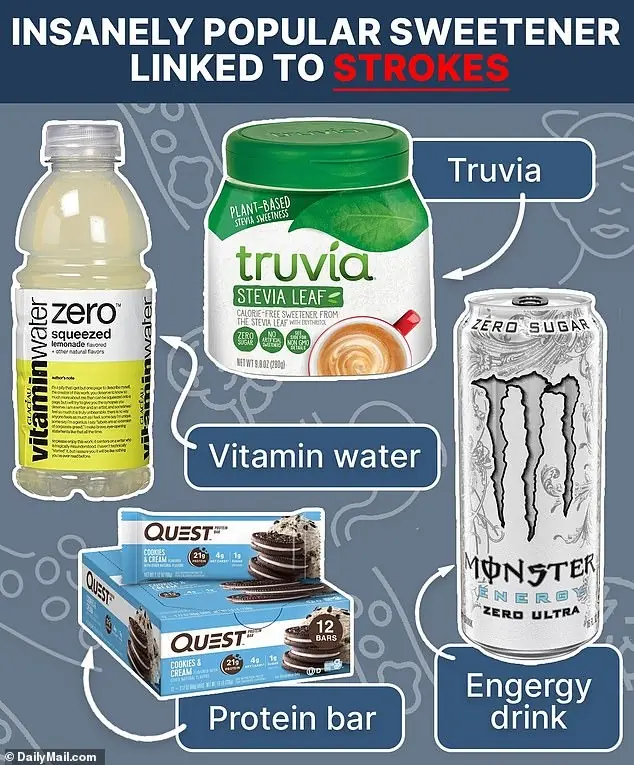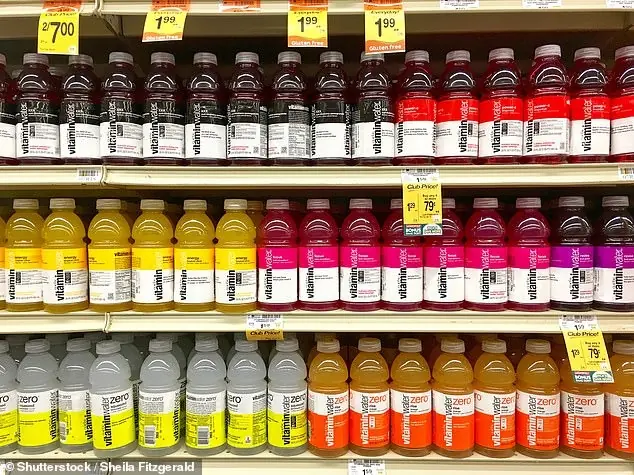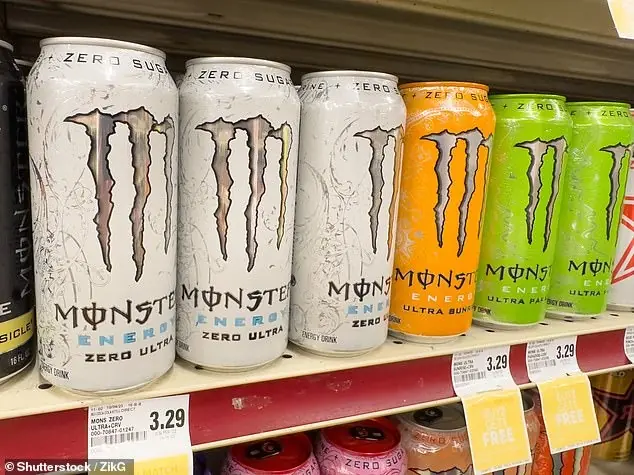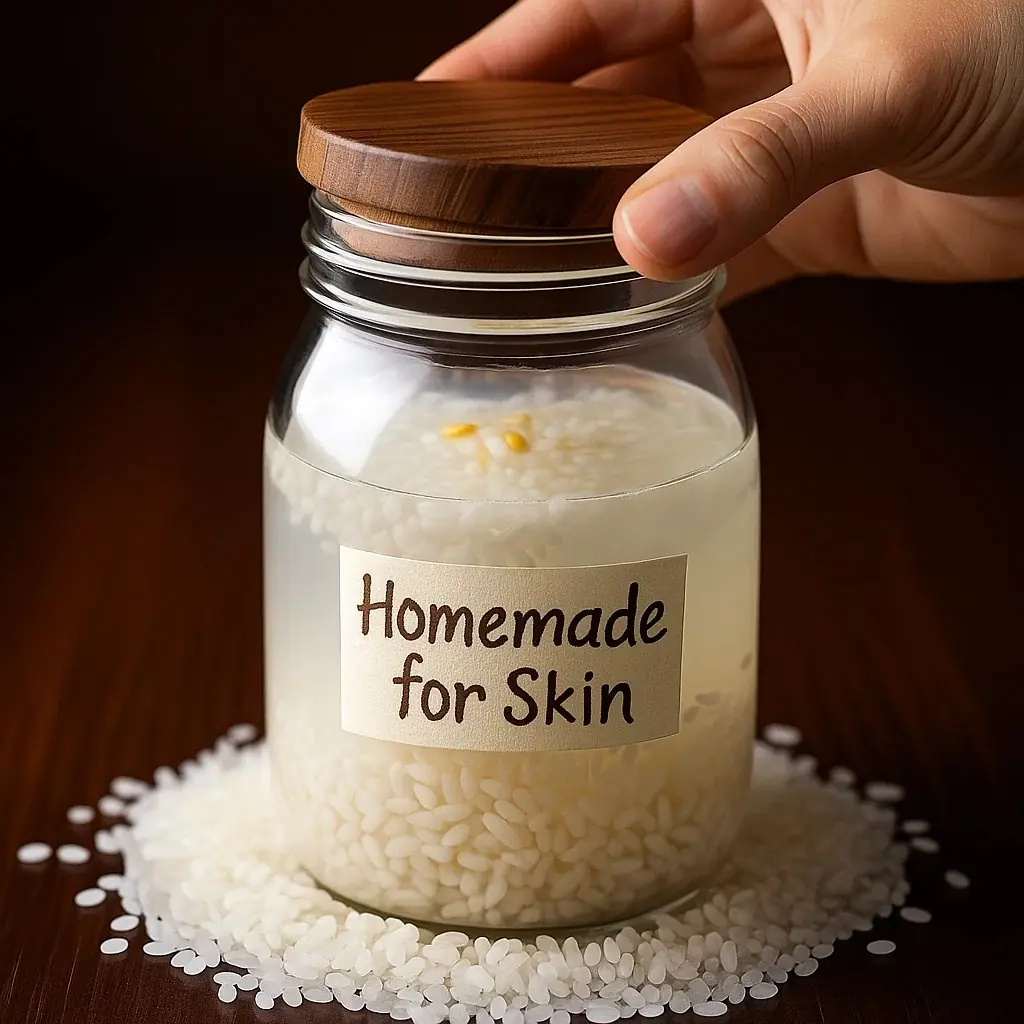
You're showering wrong! Doctor reveals common washing error that could be life-threatening
Showering is an essential part of daily hygiene, but the temperature of the water can have significant effects on your health.
A new study has raised serious concerns about a widely used sweetener, erythritol, suggesting that it may be linked to an increased risk of stroke. Erythritol is commonly found in many popular food and beverage products, such as sugar-free energy drinks, protein bars, and sweeteners like Truvia. It has long been marketed as a healthier alternative to sugar, but recent findings from researchers at the University of Colorado, Boulder, suggest that this seemingly innocuous ingredient could pose a danger to vascular health, potentially increasing the risk of stroke.
The study, published in the Journal of Applied Physiology, tested the effects of erythritol on human cells, specifically cells in the brain that are responsible for maintaining blood vessel health. The results, while conducted in a lab setting using isolated cells, point to significant potential risks for those consuming erythritol in large quantities. This article delves into the study's findings, examines the implications of these results, and explores the growing concerns surrounding erythritol and other artificial sweeteners.
Some popular products with Erythritol include zero sugar Monster energy drinks, Vitaminwater Zero sugar and some Quest protein bars
What is Erythritol and Why is it So Popular?
Erythritol is a sugar alcohol that is commonly used as a sweetener in a variety of sugar-free and reduced-calorie products. It is about 70% as sweet as sugar but contains only about 6% of the calories, making it a popular choice for those looking to reduce their calorie intake. Erythritol is naturally found in small amounts in some fruits and fermented foods, but the version used in processed foods is typically derived from corn through a fermentation process.
It is found in many products marketed as "healthier" alternatives to sugar, including drinks like Vitaminwater Zero, Monster Zero, and Arizona Iced Tea, as well as protein bars such as Quest. Additionally, erythritol is a key ingredient in popular sweeteners like Truvia, which many people use as a substitute for sugar in coffee and other beverages.
Despite its popularity and approval by the FDA as a safe food additive since 2001, recent studies have begun to question whether erythritol could be more harmful than previously thought.

The sweetner erythritol has been linked to a higher risk of stroke. It is used in VitaminWater products shown above
It is also used in Monster Zero products
The Study: Exposing Brain Cells to Erythritol
In the recent study conducted at the University of Colorado, researchers exposed human cells found in the brain to erythritol in concentrations that mirrored the amounts found in diet sodas. The results were alarming. The study showed that within just a few hours of exposure, the brain cells exhibited several concerning changes. Notably, the cells produced 75% more compounds that could potentially damage them and the surrounding tissue. These compounds are thought to contribute to the formation of blood clots, a key risk factor for stroke.
Additionally, the cells produced about 20% less of a compound that helps blood vessels relax, allowing for increased blood flow and reduced clot formation. This compound is essential in maintaining healthy vascular function, and its reduction could significantly increase the likelihood of clot formation, leading to a stroke. Even more worrying was the observed decrease in the production of t-PA (tissue plasminogen activator), a crucial protein involved in breaking down clots and preventing strokes.
The researchers concluded that erythritol could "potentially contribute to an increased risk of ischemic stroke," which occurs when a blood clot blocks a blood vessel in the brain, cutting off the supply of blood and oxygen to brain tissue. Ischemic strokes can lead to brain cell d:eath within minutes, making early detection and treatment vital.
Why This Study Matters: The Growing Threat of Stroke
The findings of this study are particularly concerning in light of a troubling increase in strokes among younger populations. Data from the Centers for Disease Control and Prevention (CDC) show that strokes among individuals under the age of 45 have risen nearly 15% since 2011. This surge in stroke cases among younger people has sparked a national conversation about potential contributing factors, including increased stress, poor lifestyle choices, and the rising prevalence of conditions such as obesity, high cholesterol, and diabetes.
As health experts work to understand the causes behind this increase in strokes, some have begun to point to artificial sweeteners, like erythritol, as a potential culprit. Erythritol, along with other sugar alcohols and low-calorie sweeteners, is widely used in products marketed as healthier alternatives to sugar. However, these sweeteners may come with hidden risks that are only now beginning to surface through research.
The Potential Impact on Vascular Health
One of the major concerns with erythritol, as highlighted by Dr. Max Maddahali and his colleagues, is its potential effect on vascular health. Vascular health is critical for the proper functioning of the circulatory system, as it ensures that blood can flow freely to organs and tissues throughout the body, including the brain. When erythritol disrupts the production of essential compounds like t-PA, the body’s ability to break down blood clots is impaired, making it more likely for clots to form and block blood vessels.
In addition to these effects on clot formation, erythritol's ability to alter blood vessel function could have far-reaching consequences for individuals who consume it regularly. Given that erythritol is commonly found in products consumed by people of all ages, including children, teenagers, and young adults, the long-term impact of regular exposure to this sweetener on vascular health is a matter of growing concern.
The Growing Body of Evidence Linking Erythritol to Heart Health Issues
This study is not the first to raise concerns about the potential health risks of erythritol. A 2023 study by the Cleveland Clinic tracked the health of 4,000 individuals and found that those who consumed erythritol were more likely to experience heart attacks, strokes, or early d:eath. These findings further contribute to the growing body of evidence linking erythritol to cardiovascular health issues.
Additionally, previous studies have shown that erythritol can cause platelets in the blood to become activated, leading them to stick together and form clots. This process, known as platelet aggregation, is a key factor in the development of blood clots that can cause strokes and other cardiovascular events. Given the widespread use of erythritol in food and beverage products, this potential for increased platelet aggregation is a significant concern for public health.
The Implications of Erythritol in Diet Products
Erythritol is often marketed as a healthy, low-calorie alternative to sugar, and it is a key ingredient in many diet products, including sugar-free sodas, energy drinks, and protein bars. However, the rise of diet products has coincided with an increase in health issues like obesity, diabetes, and cardiovascular diseases. This paradox raises important questions about the safety and long-term effects of consuming artificial sweeteners, particularly in the quantities that many people may be unknowingly consuming through processed foods and beverages.
The presence of erythritol in products like Monster Zero, Vitaminwater Zero, and Quest protein bars may lead consumers to believe that these items are "safe" or even "healthy" alternatives to sugary snacks and drinks. However, as the recent study shows, erythritol may carry its own health risks that outweigh its benefits, particularly when consumed in large amounts.
What Should Consumers Know About Erythritol?
While erythritol is approved by the FDA and deemed safe for use in food products, this new research calls for a more cautious approach to its consumption. Consumers should be aware of the potential risks associated with erythritol, particularly if they consume large quantities of artificially sweetened products on a daily basis.
As the research continues to evolve, experts suggest that more studies should be conducted to better understand the long-term effects of erythritol on vascular health, particularly in relation to stroke and heart disease. For now, individuals may want to reconsider their consumption of products containing erythritol, particularly if they are concerned about the growing risks of stroke and heart disease.
Conclusion: Rethinking the Safety of Artificial Sweeteners
The findings of the University of Colorado study add to the mounting evidence that artificial sweeteners like erythritol may not be as harmless as once believed. While erythritol is commonly used as a sugar substitute in many food and beverage products, the potential risks to vascular health, including the increased likelihood of blood clots and strokes, should not be overlooked. As research into the long-term effects of erythritol continues, consumers must remain vigilant and informed about the potential health risks of consuming these sweeteners.
For now, it’s important to consider the amount of erythritol being consumed through diet products and to weigh the potential risks against the benefits. Until further research can provide more conclusive answers, it may be prudent to limit the intake of artificially sweetened products, especially those containing high levels of erythritol, and opt for healthier, more natural alternatives when possible.

Showering is an essential part of daily hygiene, but the temperature of the water can have significant effects on your health.

Doctors and researchers are calling for more widespread education on the disease, urging men to take control of their health and seek help if they notice any symptoms.

The potential benefits of these medications in weight management should not overshadow the need for careful oversight and patient safety.















Stanford University researchers have developed heart and liver organoids with functional blood vessels, pushing the limits of regenerative medicine. This breakthrough opens doors to potential organ replacements and personalized tissue therapies for the fu

Research shows that sleeping over nine hours per night may lead to cognitive decline, especially in individuals with depression. Learn how excessive sleep impacts brain health and cognitive function, and how adjusting sleep habits could protect your well-

A tiny kitten found in a car cup holder becomes Turbo, a beloved companion. Read his rescue story! ❤️🐱

Amidst pandemic lockdown and personal loss, a couple's journey into shared parenting redefined their world. Discover their heartwarming story of resilience and the unbreakable bonds built with their newborn.

After years of love and effort, I discovered that my relationship was built on unspoken fears and hidden truths. A journey of heartbreak, self-realization, and letting go to heal.

A couple's love is tested when a younger boyfriend proposes, only for the father to reject him. The ensuing anger and conflict threaten their relationship. Can they overcome explosive emotions and familial expectations? A heartfelt journey of love and und

Showering is an essential part of daily hygiene, but the temperature of the water can have significant effects on your health.

Doctors and researchers are calling for more widespread education on the disease, urging men to take control of their health and seek help if they notice any symptoms.

The potential benefits of these medications in weight management should not overshadow the need for careful oversight and patient safety.

You don’t need to spend a fortune on expensive skincare products-rice water and a few simple ingredients from your kitchen are all you need to transform your skin.

After his daughter disappeared without a trace, Robert Whitmore's search for answers leads him to uncover a chilling secret. Follow his journey of perseverance, love, and determination to reunite with his daughter in this gripping tale of mystery and fami

A mother's heartbreaking journey of love, betrayal, and self-discovery when her adopted twin daughters lock her out of the house. A shocking truth awaits as secrets unfold and families are tested.

The combination of natural, nutrient-rich ingredients in this DIY oil creates a powerful remedy that helps promote hair growth from the inside out, without the need for expensive treatments or chemical-filled products.

By incorporating this serum into your daily skincare routine, you’re not only nurturing your skin but also embracing the power of nature’s ingredients.

“My wife will buy an apartment — and I’ll immediately file for divorce, taking half the property.” Anya stumbled upon her husband’s messages where he was writing to someone.


A powerful story of forgiveness and renewal as a wife discovers the pa!nful truth behind her husband's past, ultimately leading to a deep and healing reconciliation. A tale of love, loss, and second chances that will stay with you.

Each spoonful of this homemade blend provides your skin with the raw nutrients it needs to look and feel youthful.



I dressed in rags, hid my face beneath a worn-out hat, and stood on the street like a beggar—just to see what kind of man my granddaughter was marrying. I thought I was ready for anything. But what happened next left me speechless and changed everything